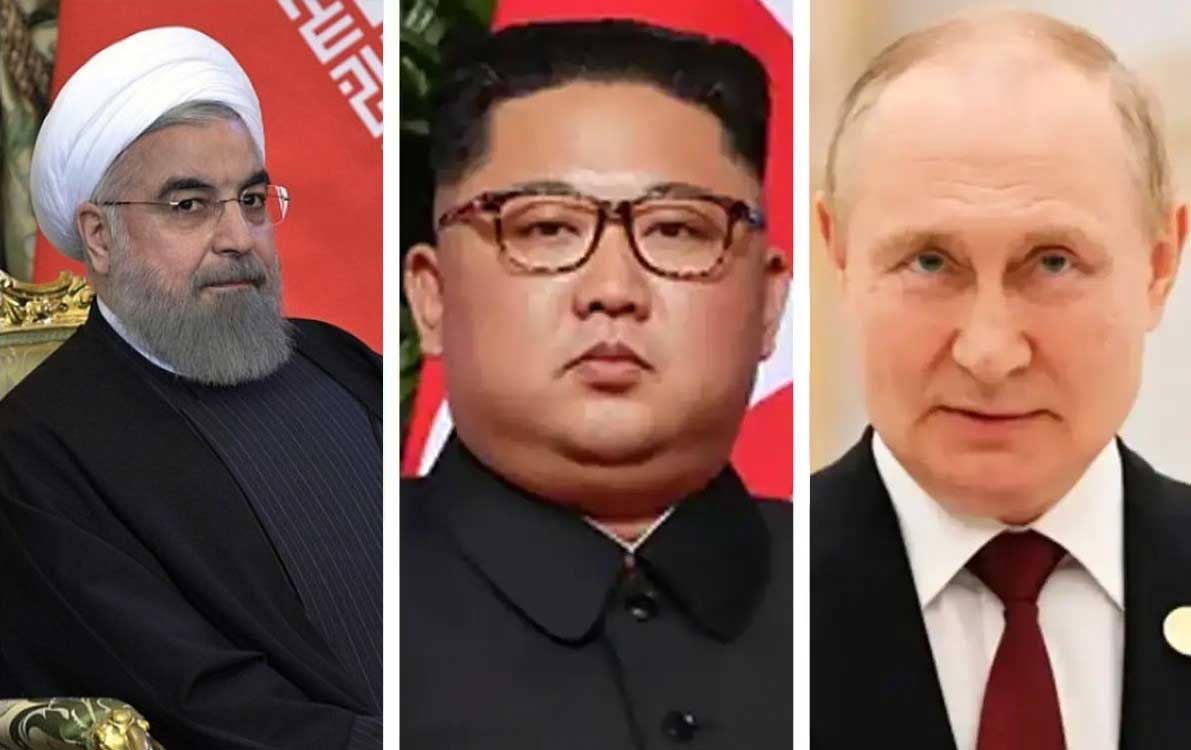When shall we three meet again?In thunder, lightning, or in rain?
The Three Witches in Macbeth
Bad things can sometimes come in threes. For Israel, issues of enemy nuclearization are many-sided, intersecting and “bewitching.” Even while the Jewish State remains the only regional nuclear power, a nuclear war could still happen.
Plausible scenarios demand prompt clarification. Even a pre-nuclear Iran could bring Israel to the point where Jerusalem’s only strategic options would be nuclear escalation or de facto capitulation. Terminologically, the second option would present as an “asymmetrical nuclear war.” Substantively, this option would spawn variously unpredictable consequences.
There will be antecedent questions. How could Israel allow itself to reach such an existential impasse? How could such an unprecedented scenario emerge? Is such perilous declension even reasonable to ponder?
In one estimation, Iran would target Israel’s Dimona nuclear reactor and/or employ radiation dispersal weapons against the Jewish State. Unique escalations could follow in the wake of an Iranian resort to biological or electromagnetic pulse (EMP) ordnance. There could also be direct interventions by already-nuclear state allies of Iran. Here, in circumstances that could involve US and/or Chinese interventions, Israel could be prevented from striking preemptively against Iranian targets by Russian and/or North Korean nuclear threats.
The plausibly worst-case narrative would be a “bolt-from-the-blue” nuclear attack by North Korea. Kim Jung Un’s troops are presently training for military action against Ukraine. This training, on behalf of Vladimir Putin, is already underway inside Russia.
Where should Jerusalem stand on resisting such potentially existential challenges from Iran’s nuclear state surrogates? Looking toward expanding conflict with Iran, any “one-off” preemption against enemy weapons and infrastructures (an act of “anticipatory self-defense” under international law[i]) would be problematic. At this late stage, inter alia, any such defensive action would need to be undertaken in calculated increments and amid an ongoing war.
For Israel, these are intellectual issues, not mere matters of “common sense.” During intersecting and possibly synergistic interactions, an imaginative dialectic[ii] would need to guide Israel’s strategic policy. As part of its escalating war against Iran, Israel could calculate that it had no choice but to launch multiple and mutually-reinforcing preemptive strikes against specific nuclear-related targets.[iii] Simultaneously, Russian and/or North Korean threats of support for Iran could lay the groundwork for a multi-state nuclear war, a sui generis conflict that could sometime involve the United States and/or China.
In Jerusalem, such a worrisome narrative ought never to be dismissed out of hand. It could be tempting to regard such jaw-dropping interventions as “speculative” or “unlikely,” but there would remain no science-based way to estimate the probabilities of a unique event. True probabilities, Israeli planners should understand, can never be determined ex nihilo (“out of nothing”).
In the final analysis, Israel’s requires “high thinkers,” and these exceptional planners will need to make decisions based on long-established standards of valid extrapolation, deduction and internal consistency. Though there is no actual data on the subject of nuclear war, a useful deductive apparatus can still be constructed. The legitimate object of this explanatory apparatus would be the systematic derivation of logically entailed and policy-relevant conclusions from tangibly interconnecting assumptions. Without such an effort, of analytic necessity, Israeli strategic decisions could be limited to more-or-less disconnected assessments or (worst of all possibilities) “common sense.” For Israeli strategists, there could be no greater mistake than any reliance upon “common sense.”
There is more. To the extent that they might be usefully estimated, the risks of an Israel-Iran nuclear war will depend on whether such a conflict would be intentional, unintentional, or accidental. Apart from applying this three-part distinction, there would be no adequate reason to expect operationally-gainful intellectual assessments.
Ensuring existential protections from openly declared Iranian aggressions, Jerusalem should always bear in mind that even the Jewish State’s physical survival ought never to be taken for granted. At some point, even a seemingly powerful nuclear weapons state could be left with only militarily irrelevant options. That point would allow assorted residual options for revenge, but none for durable safety and national security.
An unintentional or inadvertent nuclear war between Jerusalem and Teheran could take place not only as the result of misunderstandings or miscalculations between rational leaders,[iv] but also as the unintended consequence of mechanical, electrical, or computer malfunction. This brings to mind a further distinction between unintentional/inadvertent nuclear war and accidental nuclear war. Though all accidental nuclear wars must be unintentional, not every unintentional nuclear war must be by accident.
On one occasion or another, an unintentional or inadvertent nuclear war could be the result of fundamental human misjudgments about enemy intentions. By definition, this result would be catastrophic. It could prove to be irremediable and irreversible.
In all related calculations, history will matter. An authentic nuclear war has never been fought. Accordingly, there are no experts on “conducting” or “winning” a nuclear war. Immediately, in Jerusalem, this understanding should be considered axiomatic and overriding.
About the need for “high thinkers,” who should be Israel’s models for such extraordinary intellectual capacity? In essence, we are speaking here of the caliber of Szilard, Fermi, Oppenheimer, Einstein, Bohr and assorted others,[v] not to fabricate another “gadget” (the euphemism used by Manhattan Project physicists about their goal), but to orchestrate Israel’s nuclear deterrent via coherent postures of calculated non-use. Such planning should always be initiated and expanded at an advanced theoretical level. This task could never be suitably assigned to operational specialists, even the “smartest” and most reliable. For Israel, much more will be needed than capable and industrious professionals.[vi]
Providing for Israeli national security amid a still-nuclearizing Iran ought never to be treated as a “game of chance.” Without a systematic and theory-based plan in place, Israel would render itself unprepared for an Iranian nuclear conflict that is deliberate, unintentional or accidental. At every stage of its self-propelling competition with Tehran, Jerusalem should never lose sight of the only sensible rationale for maintaining national nuclear weapons and doctrine.[vii] That rationale is (1) stable war management at all identifiable levels; and (2) reliable nuclear deterrence of all applicable threats.
Most urgently, Israel’s strategic plans will have to include prompt policy shift from “deliberate nuclear ambiguity” to “selective nuclear disclosure.” The animating logic of this shift would not be to reframe the obvious (i.e., that Israel is an extant nuclear power), but to remind all would-be aggressors that Jerusalem’s nuclear weapons are operationally usable at every level of warfare. Nonetheless, even with optimal prudential planning, Russian and/or North Korean threats to Israel could become overwhelming. Ipso facto, Jerusalem will also need to remain prepared for derivative scenarios.[viii]
Reduced to its essentials, a worst case scenario for Israel would commence with progressively explicit threats from Moscow about Israeli preemption costs. Israel, aware that it could not reasonably expect to coexist indefinitely with a nuclear Iran, would proceed with its planned preemptions in spite of dire Russian warnings. In subsequent response, Russian military forces would begin to act directly against Israel, seeking to persuade Jerusalem that Moscow is in a superior position to dominate all conceivable escalations. Alternatively, Putin could delegate such military responsibilities to North Korea, an Iranian ally that is presently preparing (within Russia itself) to augment Russian military forces against Ukraine.
For Vladimir Putin, such a persuasive effort should not be a “hard sell.” Unless the United States were willing to enter the already-chaotic situation with openly unrestricted support for Israel,[ix] Moscow would have no foreseeable difficulties in establishing “escalation dominance.” Correspondingly, well-intentioned supporters of Israel could over-estimate the Jewish State’s relative nuclear capabilities and options, a judgment that Sigmund Freud[x] would likely have called “wish fulfillment” and that could steeply endanger Israel’s physical survival.
In war, even state-of-the-art military operations would have determinable limits. In essence, there is no clear way in which the capabilities and options of a state smaller than America’s Lake Michigan could “win” at competitive risk-taking vis-à-vis Russia or North Korea. For Israel in such tangibly asymmetrical circumstances, self-deflating candor would prove safer than any self-deluding bravado.
As a strategic objective, Israel ought always to avoid armed struggle against a vastly superior nuclear adversary. This imperative would not pose problems with regard to a newly-nuclear Iran (though Jerusalem ought still to do whatever possible to prevent Iranian nuclearization), but it would present a very serious problem if it concerned an already “mature” nuclear adversary in Pyongyang.
What about the United States? Would the incoming American president accept an alliance commitment that could place millions of citizens in positons of existential vulnerability? If Donald Trump would accept the long-term benefits of honoring US security guarantees to allies, the world could be looking at another Cuban Missile Crisis or some similar kind of confrontation. If, however, this president would take the position he had expressed during the 2024 election campaign concerning Russia’s aggression against Ukraine (“Let Putin do whatever the hell he wants”),[xi] Jerusalem could have no choice but to accept a nuclear Iran. A direct military confrontation with Russia would not be one in which Israel could ever reasonably expect to prevail.
There will be additionally important issues of nuclear doctrine. In his continuing war of aggression and genocide against Ukraine, Vladimir Putin has been recycling provocative elements of Soviet-era strategic thinking. One critical element concerns the apparent absence of any “firebreak” between conventional and tactical nuclear force engagements. Now, much as it was during the “classical” era of US-Soviet nuclear deterrence, Moscow identifies the determinative escalatory threshold with first-use of high-yield, long-range strategic nuclear weapons, not first use of tactical (theater) nuclear weapons.
This “fuzzy” nuclear escalation doctrine is not shared by Israel’s United States ally, and could erode any once-stabilizing barriers of intra-war deterrence between Moscow and Washington. Whether sudden or incremental, such erosion could impact the plausibility of both deliberate and inadvertent nuclear war. As Israel could need to depend on firm US support in countering Russian nuclear threats, Vladimir Putin should be granted an immediately prominent place in Israel’s threat assessments of Iranian nuclear progress.[xii]
For Israel, the bottom-line of all such dialectical analysis is the invariant obligation to analyze strategic options as an intellectual task.[xiii] Among other things, reaching rational judgments on defensive first strikes against a still pre-nuclear Iran will require informed anticipations of (1) Russian and/or North Korean intentions; and (2) United States willingness to stand by Israel in extremis. Israel’s growing nuclear war hazards include variously tangible scenarios of Russian or North Korean interventions on behalf of Iran.
In Jerusalem’s continuously nuanced calculations,[xiv] these scenarios should assume primary importance.[xv] Sometimes, as in Shakespeare’s Macbeth, a bewitching tragedy can come in threes.
[i] The international law origins of anticipatory self-defense lie in The Caroline, a case that concerned the unsuccessful rebellion of 1837 in Upper Canada against British rule. Following this case, the serious threat of armed attack has generally justified selected militarily defense actions. In an exchange of diplomatic notes between the governments of the United States and Great Britain, then U.S. Secretary of State Daniel Webster outlined a framework for self-defense that did not require an antecedent attack. Here, the jurisprudential framework permitted a military response to a threat so long as the danger posed was “instant, overwhelming, leaving no choice of means, and no moment for deliberation.” See: Beth M. Polebaum, “National Self-defense in International Law: An Emerging Standard for a Nuclear Age,” 59 N.Y.U.L. Rev. 187, 190-91 (1984) (noting that the Caroline case had transformed the right of self-defense from an excuse for armed intervention into a legal doctrine). Still earlier, see: Hugo Grotius, Of the Causes of War, and First of Self-Defense, and Defense of Our Property, reprinted in 2 Classics of International Law, 168-75 (Carnegie Endowment Trust, 1925) (1625); and Emmerich de Vattel, The Right of Self-Protection and the Effects of the Sovereignty and Independence of Nations, reprinted in 3 Classics of International Law, 130 (Carnegie Endowment Trust, 1916) (1758). Also, Samuel Pufendorf, The Two Books on the Duty of Man and Citizen According to Natural Law, 32 (Frank Gardner Moore., tr., 1927 (1682).
[ii] Israel’s strategists should always approach their subject as a dialectical series of thoughts, one wherein each important idea presents a complication that moves onward to the next thought or idea. Central to this dialectic is the obligation to continue thinking, an obligation that can never be fulfilled altogether because of what the philosophers call an infinite regress problem. Still, it is an obligation that must be undertaken as fully and as competently as possible. The term “dialectic” originates from an early Greek expression for the art of conversation. A currently more common meaning is that dialectic is a method of seeking truth by correct reasoning. More precisely, it offers a method of refutation by examining logical consequences, and also the logical development of thought via thesis and antithesis to an eventual synthesis of opposites. In the middle dialogues of Plato, dialectic emerges as the quintessential form of proper philosophical/analytical method. Here, Plato describes the dialectician as one who knows how to ask, and then answer, questions. In the particular matter of Israeli nuclear strategy, this kind of knowledge must precede all other compilations and inventories of military facts, figures, force structures and power balances.
[iii] From the standpoint of international law, it is necessary to distinguish preemptive attacks from “preventive ones.” Preemption is a military strategy of striking an enemy first, in the expectation that the only alternative is to be struck first oneself. A preemptive attack is launched by a state that believes enemy forces are about to attack. A preventive attack, however, is launched not out of genuine concern about “imminent” hostilities, but for fear of a longer-term deterioration in a pertinent military balance. In a preemptive attack, the length of time by which the enemy’s action is anticipated is very short, while in a preventive strike the interval is considerably longer. A core problem for Israel, in regard to Iran and its already-nuclear allies, is not only the practical difficulty of determining imminence, but also that delaying a defensive strike until imminence is fully verified could be fatal.
[iv] Expressions of decisional irrationality could take various different and overlapping forms. These include a disorderly or inconsistent value system; computational errors in calculation; an incapacity to communicate efficiently; random or haphazard influences in the making or transmittal of particular decisions; and the internal dissonance generated by any structure of collective decision-making (i.e., assemblies of pertinent individuals who lack identical value systems and/or whose organizational arrangements impact their willing capacity to act as a single or unitary national decision maker).
[v] An obvious example of such “assorted others” is Yuval Ne’eman, whose assessment of Israel’s 7 June 1981 strike against the Iraqi nuclear reactor at Osiraq is included in the Menachem Begin Heritage Center’s authoritative collection (Jerusalem, September 2003). Other principal collection contributors were former PM Yitzhak Shamir; Lt. Gen. (res.) Rafael Eitan (Raful); Maj. Gen. (res.) David Ivri (IAF commander at time of “Operation Opera”); and this writer, Professor Louis René Beres USA). Professor Beres’ contribution was co-authored with former IAF Chief of Planning, COL. Yoash Tsiddon-Chatto.
[vi] To the extent that IDF strategy is accessible to the public, we know that conflict missions are designed inter alia to eliminate “the enemy’s” will to fight and achieve long-term deterrence. IDF planning also envisions “cumulative deterrence” via a series of unequivocal military victories and “intelligence superiority,” which is not the same thing as the “intellectual superiority.” Overall, IDF military posture calls for a continuing search for “targets of opportunity,” a concept of offense that is based on Israel’s qualitative edge, and a sustainable “critical mass” of forces and capabilities. It could reasonably be assumed that this IDF “critical mass” concept embraces both metaphoric and literal meanings.
[vii] Military doctrine is not the same as military strategy. Doctrine “sets the stage” for strategy. It identifies various central beliefs that must subsequently animate any actual “order of battle.” Among other things, military doctrine describes underlying general principles on how a particular war ought to be waged. The reciprocal task for military strategy, more specific than doctrine, is to adapt as required to support a previously-fashioned military doctrine
[viii] The expected security benefits to Israel of any considered reductions in “deliberate nuclear ambiguity” must remain more-or-less dependent upon Clausewitzian “friction.” This classic term of operational military planning references the always-unpredictable effects of errors in knowledge and information concerning intra-Israel (IDF/MOD) strategic uncertainties, Israeli and adversarial underestimations or overestimations of relative power position and the unalterably vast and largely irremediable differences between abstract theories of deterrence and actual enemy intentions.
[ix] On interconnections between US and Israeli nuclear strategy, see by this author, with a special postscript by USA General Barry McCaffrey (ret.), a 2016 monograph published at Tel Aviv University: https://sectech.tau.ac.il/sites/sectech.tau.ac.il/files/PalmBeachBook.pdf
See also: Louis René Beres, http://ssi.armywarcollege.edu/pubs/parameters/Articles/07spring/beres.pdf
[x] Sigmund Freud always sought to “excavate” deeper meanings concerning human behavior. In essence, he was a modern-day philosophe, a proud child of the eighteenth-century Enlightenment who discovered profound analytic and therapeutic advantages in sometimes-arcane literary insights. Freud maintained an extensive personal collection of antiquities which suggested variously penetrating psychological insights. Some of his special collection was placed directly on his work desk; reportedly, he would often touch and turn the individual artifacts while engaged in some challenging thought.
[xi] February 10, 2024.
[xii] There is a pertinent and documented history to this argument. During the June 1967 Six-Day War, Moscow activated a joint plan with its client regimes in Egypt and Syria to provoke Israel into a pre-emptive strike. The plan included a Russian naval landing on Israeli beaches after Israel had been lured into a first strike and branded the aggressor state. See: Isabella Ginor and Gideon Remez, Foxbats over Dimona: The Soviets’ Nuclear Gamble in the Six-Day War (Yale University Press, 2007).
[xiii] The primacy of “mind” concept goes back at least as far as ancient Greece and Rome. For the best “classical” statement on such primacy, see F. E. Adcock’s comment that “the highest achievements of the Greek art of war are more to be found in the triumph of mind over mind than of mind over matter.” (The Greek and Macedonian Art of War, University of California Press, 1962), p.63.
[xiv] Such calculations need not take account all potentially relevant factors. Clarification of such disclaimer can be found at “Occam’s Razor” or the “principle of parsimony.” This axiom of analytic investigation stipulates preference for the simplest possible explanation that is still consistent with scientific method. Regarding current concerns for Israel’s nuclear strategy, it suggests, inter alia, that the country’s military thinkers not seek to identify and examine every seemingly important variable, but rather to “say the most, with the least.” This presents an important and often neglected imperative because, too often, strategists and planners mistakenly attempt to be too inclusive. In essence, by distracting themselves with “common sense” understandings of “inclusion,” these strategists and planners are kept from forging “parsimonious” (hence useful) theory.
[xv] To summarize, Israeli decisions on preemption options should be based on (a) expectations of enemy rationality/irrationality; (b) expected likelihood of enemy first-strikes; (c) expected costs or disutility of enemy first-strikes; (d) expected schedule of enemy nuclear weapon deployments; (e) expected efficiencies of enemy active defenses over time; (f) expected efficiencies of Israel’s active defenses over time; (g) expected efficiencies of Israeli hard-target counterforce operations over time; (h) expected reactions of presumptively unaffected regional enemies; (i) expected US, Russian and North Korean reactions to the Israeli preemptions; and (j) expected world community reactions to Israel’s defensive strikes.


























